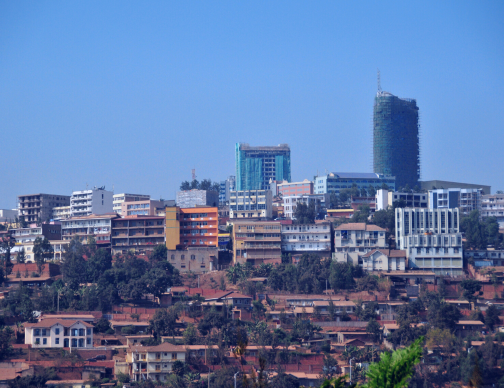Establish your presence globally with Neeyamo – Global Payroll services and EOR services as we help you go beyond borders to manage your international global payroll and hire new talent in Rwanda.
Overview
Since the early 2000s, Rwanda's economy has experienced significant growth, thanks to the government's vision and proactive measures that have positively impacted the country's citizens' living standards. Rwanda has the world's highest proportion of female parliamentarians, setting an inspiring precedent for gender equality in governance.
Do your organization's expansion plans require hiring employees in a country striding towards gender equality and economic prosperity? Do you lack a physical entity in the country – a key requisite to hire local talent? Neeyamo – one of the top Global payroll providers, assists organizations worldwide with onboarding and managing employees in Rwanda- processing payroll, managing local compliance requirements, benefits, and more.
Tools And Instances
Facts And Stats
Capital
Kigali
Currency
Rwandan franc (Rfr)
Official Language
Kinyarwanda, English, French
Fiscal Year
1 January- 31 December
Date Format
DD/MM/YYYY
Country Calling Code
+250
Other Languages
French, English, and Swahili
Time Zone
UTC+02:00
Global Payroll
Overview
What is Global Payroll?
Handling payroll for a widespread workforce can pose a significant challenge for any organization, and the added complication of compliance can make things worse. If companies spend more time processing payroll, it directly impacts day-to-day operations and their overall productivity. The solution to this is global payroll outsourcing.
What is a global payroll system?
Over the years, Neeyamo – Global Payroll Services has observed these complexities and strived to provide global payroll solutions through a single technology platform – Neeyamo Payroll. Neeyamo's global payroll systems ease the process for companies looking to outsource their global payroll requirements and aid them in maneuvering the tricky payroll system in Rwanda. Neeyamo's payroll software provides the perfect solution for all your global payroll needs – for employees working in primary geographies, the long-tail region, remote or internationally located.
How is payroll calculated?
Neeyamo acts as your personalized Payroll Calculator. Ensuring adherence to local regulatory requirements using multi-level controls. Providing timely and accurate payroll, courtesy of our experts worldwide and using a tech-based integrated smart helpdesk solution with seamless support experience manned by payroll experts - Neeyamo has all your payroll needs covered.
Payroll Taxes
Payroll tax is the percentage amount retained from an employee's salary and paid to the government to invest in the general population's welfare. These are statutory in nature and are levied from both the employer and employee. Additional statutory contributions are made by employers towards aiding both short-term and long-term benefits for their employees.
Employee Taxes
The employee taxes in Rwanda are computed as follows:
| Social Security (RSSB) medical insurance (this is not compulsory, and the employer may subscribe to medical insurance with a private insurance company) | 7.50% |
| Pension scheme | 3.00% |
| Social Security (RSSB) maternity leave benefits | 0.30%& |
| Community-based Health Insurance Scheme: Local and expatriate employees are obliged to contribute 0.5% of their net salaries | 0.50% |
Employer Taxes
The employer taxes in Rwanda are computed as follows:
| Social Security (RSSB) medical insurance | 7.50% |
| Social Security (RSSB) occupational hazards | 2.00% |
| Pension scheme | 3.00% |
| Social Security (RSSB) maternity leave benefits | 0.30% |
Payroll Cycle
Overview
Undoubtedly, payroll is a critical process for any organization. The pay cycle in Rwanda refers to the period for which an organization pays its employees, and this can vary depending on the pay frequency that the organization chooses to adopt.
Frequency
The pay frequency in Rwanda is monthly.
13th Month Cycle
There is no such statutory requirement in Rwanda.
Global Work
Overview
What is Employer of Record?
An Employer of Record services / EOR services provider helps you eliminate the hassle of handling complexities while onboarding a new employee in an international location. They help bridge the gap that otherwise mandates organizations to have a local registered entity and a local bank account prior to making a job offer to an international hire.
An Employer of Record services / EOR services provider acts as a legal employer, facilitates salary payments, and manages other statutory requirements such as health insurance, payroll taxes, and employee benefits, ensuring compliance with local tax laws and regulations.
This allows organizations to focus on collaborating with the employee in Rwanda for operational tasks, with the knowledge that they have a cost-effective solution to support their global payroll management & HR requirements as they continue their global expansion.
HR Mandates and Practices
Minimum Wage
As stipulated in a 1973 law, the daily minimum wage is 100 RWF. In practice, employees earn a much higher wage. The salary applicable to each professional category is determined under a collective labor convention/agreement.
Overtime
Overtime cannot exceed 30 days unless there is an employment contract to the contrary.
Overtime is calculated as hours exceeding the weekly legal working hours, which is 45 hours or contractual working hours if agreed as less than 45 hours per week.
Data Retention Policy
Data retention for Rwanda is two years.
Hiring and Onboarding Requirements
Hiring
The Rwandan hiring process begins with an employment contract in place. This applies to both contractors as well as full-time employees. It is legally required to put a written employment contract in place in Rwanda, in the local language, which spells out the terms of the employee’s compensation, benefits, and termination requirements.
An offer letter and employment contract in Rwanda should always state the salary and any compensation amounts in Rwandan francs rather than a foreign currency.
Onboarding
- The process is to make the employee comfortable and enable them to express their expectations.
- Documents are collected from employees, and the employment contract and duties are discussed.
- As per the company, specific norms are delivered to employees, especially the code of conduct and regulations of the office.
Probation
The probation period in Rwanda cannot exceed three months. The employer-based on the nature of work, employee's performance, and conduct--can extend the probation period to another three months. If the probation period turns out to be successful, the employee is immediately offered employment, and the same is notified in writing.
On the contrary, if the probation period turns out to be unsuccessful, the employee gets immediately terminated sans terminal benefits. The re-employment of an employee does not allow for a probation period.
Leave
Public Holiday
There are 14 national holidays in Rwanda:
- Jan 1 to Jan. 3: New Year's Day
- Feb. 1: National Heroes Day
- Apr. 7: Good Friday
- Apr. 7: Tutsi Genocide Memorial Day
- Apr. 10: Easter Monday
- Apr. 21: Eid Al-Fitr
- May 1: Labor Day
- Jun. 28: Eid Al-Adha
- Jul. 1 to Jul. 3: Independence Day
- Jul. 4: Liberation Day
- Aug. 4: Umuganura
- Aug. 15: Assumption Day
- Dec. 25: Christmas
- Dec. 26: Boxing Day
Sick Leave
Short-Term Sick
Leave A competent authority may grant to a public servant a short-term sick leave not exceeding fifteen (15) days for reasons of sickness ascertained by a recognized medical doctor.
Long-Term Sick
Leave An employee is entitled to sick leave of up to 6 months if certified by the doctor. The employer may require the worker to submit a certificate signed by three recognized medical doctors if the illness goes beyond 15 days. The employer is not obliged to pay the worker who is absent for more than two days without providing a medical certificate. Of the maximum of 6 months of sick leave, the first three months are paid, while the last three months are unpaid.
Maternity Leave
Female employees are entitled to 12 weeks of paid maternity leave in Rwanda, with no less than 14 days of leave prior to the due date. Maternity confirmation certificates must be provided before any maternity leave can commence.
Paternity Leave
Fathers are entitled to 4 working days of paid leave in case of the delivery of their wives.
Other Leave
Annual Leave: Employees are entitled to a minimum of 18 days of paid annual leave (increasing to 24 days for employees under the age of 18). The number of days increases in accordance with the length of service as stipulated in the employment contract and labor law.
Leave in case of the death of the mother
Additional leave of twenty (20) calendar days in addition to incidental leaves shall be granted to the father of the child when the child’s mother dies in childbirth, leaving behind her baby.
Jury Duty Leave and Voting Leave :
Authorized absence for one-day maximum not deducted from annual leave may be granted to a public servant by his/her immediate supervisor for duly justified reasons.
Bereavement Leave :
- In case of death of his/her spouse: six (6) working days;
- In case of death of the first-degree ascendant: three (3) working days;
- In case of death of the employee’s child in the direct line in the first degree or adoptive child: four (4) working days;
- In case of death of the employee’s brother or sister in the direct line in the first degree: two (2) working days;
- In case of death of the employee’s father-in-law or mother-in-law, two (2) working days.
Termination
Notice Period
15 days notice:
For employees within the first year of service - increasing to 1 month following completion of one year of service.
Severance Pay
Employees are generally entitled to severance pay after one year of service.
Severance pay is given as follows:
- Less than five years of service, then the employee gets one month’s salary
- Five to 10 years of service, then the employee gets two months’ salary
- 10-15 years’ service, then the employee gets three months’ salary
- 15-20 years’ service, then the employee gets four months’ salary
- 20-25 years’ service, then the employee gets five months’ salary
- 25+ years’ service, then the employee gets six months’ salary
Visa
Overview
The different types of Visa options available in Rwanda are as follows:
- Entry Visa- A foreigner who wants to visit Rwanda for purposes other than a visit, holiday, sightseeing, or recreation.
- Crew Visa- Exclusively for crew members. It is valid only for 72 hours.
- Visitors Pass- This is issued to a citizen of the East African Community.
- Tourist Visa – There are 12 types of visas available:
- T1 - Tourist
- T2 - Tourist
- T3 - Family
- T4 - Visiting diplomat
- T5 - Job search
- T7 - Business
- T8 - Medical treatment
- T9 - Group tourist
- T10 - Itinerant business person
- T11 - Bridging
- T12 - East Africa tourist visa
- Temporary Resident Permit - This permit can be applied only when you enter Rwanda. The duration for application is 15 days.
- Dependent Visa- This visa is issued to dependents in the family.
- Student Visa – Visa for students.
Employee Background Checks
Legal and Background Checks
In Rwanda, the following background checks can be done while hiring an employee:
- Criminal Records
- Civil Records
- Education Degree
- Employment Verification
- Global Monitor check
- Id check
Last updated on September 13, 2023
If you have any queries or suggestions, reach out to us at irene.jones@neeyamo.com
Heeft u vragen? Neem contact met ons op
Neem contact op met een van onze experts en neem een korte demo van onze diensten





